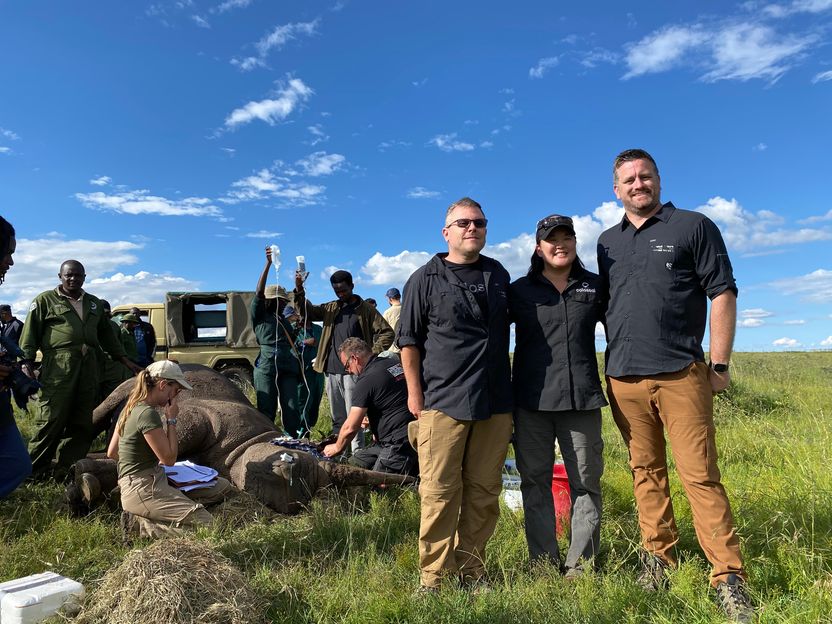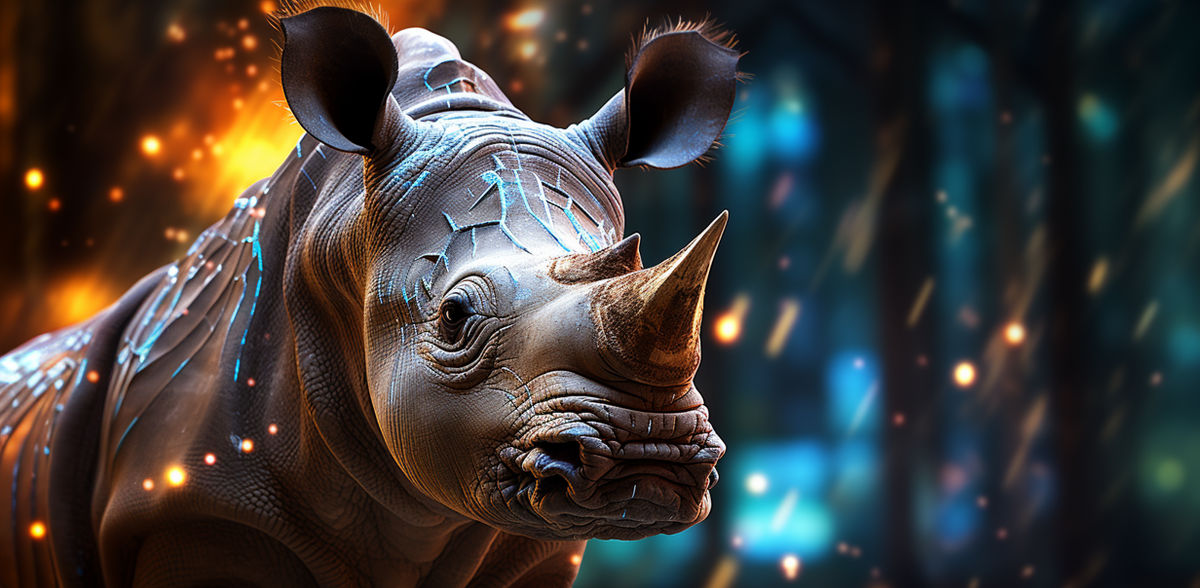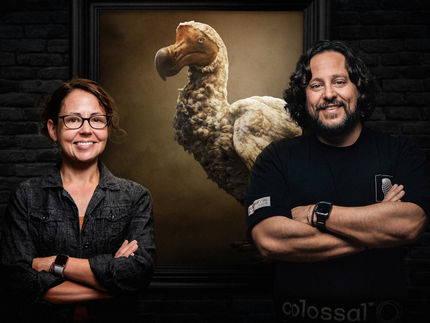Start-up Colossal Biosciences Joins Biorescue In Its Mission To Save The Northern White Rhino From Extinction
Colossal will assist the rescue mission by leveraging genome sequencing and gene editing methods to save the endangered species
Advertisement
With only two living females left, the partnership will contribute to the genetic recovery of the northern white rhino from complete extinction. Colossal developed a pioneering toolkit for the challenging task to restore genetic diversity from museal specimens for a living population of critically endangered species.

A team from Colossal at a BioRescue procedure at the Ol Pejeta Conservancy, Kenya
Steven Seet/Leibniz-IZW
Colossal Biosciences, the world’s first de-extinction company, has teamed up with BioRescue, a consortium initiating and leading the scientific rescue mission of the northern white rhino employing advanced assisted reproduction technologies and stem cell associated techniques. The partnership will develop a roadmap for future rescue missions of endangered species using the world leading expertise of both organisations.
Together they will work to improve, develop and implement strategies in the fields of wildlife conservation research and wildlife veterinary medicine, providing approaches to reduce the sixth mass extinction.
The northern white rhino (Ceratotherium simum cottoni) is considered to be functionally extinct in the wild as a direct result of poaching. Its natural habitats include parts of Uganda, Chad, Sudan, the Central African Republic and the Democratic Republic of Congo. All these areas were completely emptied out of this charismatic megavertebrate more than a decade ago. The only two living females were born in the Czech ZOO Dvůr Králové and are being cared for at Ol Pejeta Conservancy in Kenya since 2009.
Prof. Dr. Thomas Hildebrandt, Project Head at BioRescue, Head of the Department of Reproduction Management of the Leibniz Institute for Zoo and Wildlife Research, and Member of the Scientific Advisory Board of Colossal, has spent over 25 years on a mission to save the northern white rhino species. He has led the efforts with BioRescue to convey how synthetic biology can be used in addition to the genetic rescue techniques that are already in place. “The northern white rhino is the world’s rarest large mammal and thousands of species are interlinked to its existence,” says Hildebrandt. “With Colossal’s advanced genetic technology, we will be able to piece together the missing links of the species’ genetic history. Following decades of assisted reproduction and stem cell innovations made by scientists and conservationists, I’m thrilled that the partnership between Colossal and BioRescue will help to establish a sustainable and genetically robust northern white rhino population.”
The new partnership will assess the genetic diversity of the northern white rhino (Ceratotherium simum cottoni) in historic samples as the basis for ethically evaluated decisions on possibly enhancing the genetic variability of a future northern white rhino population. This ground breaking conservation strategy is accompanied by exemplary transparency of the project’s undertakings to the general public.
The Science Behind the Conservation
Colossal will assist the rescue mission by leveraging genome sequencing and gene editing methods to save the endangered species. The focus on the edits will be to improve genetic diversity in living cells and mitigate impacts of disease or lost adaptability to the changing climate.
- Sequencing: The partnership will generate a global catalog of museum samples of northern white rhino specimens from the past, including bones, dry skin, and preserved organs and fetuses, which can be used to extract ancient DNA. The partners will then obtain preserved samples in order to sequence all suitable samples and study the genetic diversity of the species.
- Genetic Editing: Once loss to gene pools has been identified in preserved specimens, Colossal will use the identified sequences as targets to restore the lost diversity into cell lines that will be used to produce northern white rhino embryos.
- Population Study: The team will conduct a population study of genetic diversity of the southern white rhino (Ceratotherium simum simum) which is the sister taxon of the northern white rhino to identify key aspects of a healthy population. Colossal will leverage FormBio, its technology spinoff, to complete this study. FormBio’s comparative genomic tool allows scientists to compare the DNA and genome of the specimens to the northern white rhino population we have today and identify genetic diversity that existed before the massive decline of the species.
“We’re very honored to be BioRescue’s genetic rescue partner and thus have the opportunity to help save the northern white rhino, as well as other iconic keystone species from the brink of extinction,” says Ben Lamm, CEO and Co-Founder of Colossal. “At Colossal we’re passionate about species preservation and as part of our larger de-extinction work, we want to leverage our techniques and toolkit for conservation. We are creating tools that will allow us to heal what has been lost and restore ecosystems that will be sustainable for future generations.”
The Conservation Paradox
The rate at which species loss is occurring is significantly faster than the restoration efforts of the classical conservation approaches. Between now and 2050, humanity will lose up to 50% of all biodiversity if nothing changes. The vast majority of conservation efforts are focused on preserving landscapes and ending poaching. But, with only two remaining northern white rhinos, the need to add more advanced technologies to preserve the taxon becomes apparent. In order to stop the loss, there is a need for new tools and technologies. The partnership is developing these tools to improve the capacity of the conservation ecosystem.
“We're really thankful to Prof Dr. Hildebrandt and BioRescue for trusting us as a partner to provide de-extinction technologies for the rescue of the northern white rhino,” says Matt James, Head of Conservation and Colossal’s Chief Animal Officer. “De-extinction is an engine of innovation that leads to tools that are directly applicable to conservation. Together, with some of the leading people in their fields, we will successfully be able to address and remedy specific conservation problems - starting with the northern white rhino.”
Colossal and BioRescue’s partnership is the starting point for future modern conservation networks which will help improve international conservation and conservation research organizations.
“The BioRescue Consortium is a unique model of extensive international cooperation that involves top scientists from Germany, Japan and Italy, conservationists in the field in Africa as well as zoo experts from Europe. This new partnership with Colossal transforms existing conservation approaches to a new level and can serve as a blueprint for other international efforts to save endangered species,” says Jan Stejskal, Director of International Projects at Dvůr Králové and coordinator of efforts to save the northern white rhinos.
Colossal’s Conservation Toolkit
Colossal’s conservation toolkit is a set of resources the company employs to help partner organizations preserve and save species at-risk. The company utilizes its expertise to preserve lost genetic diversity and create the hardware necessary for species rebirth and restoration to improve today’s conservation efforts. Now, Colossal will also provide these services as the synthetic genomic arm of BioRescue.
Other news from the department science
Most read news
More news from our other portals
Something is happening in the life science industry ...
This is what true pioneering spirit looks like: Plenty of innovative start-ups are bringing fresh ideas, lifeblood and entrepreneurial spirit to change tomorrow's world for the better. Immerse yourself in the world of these young companies and take the opportunity to get in touch with the founders.























































